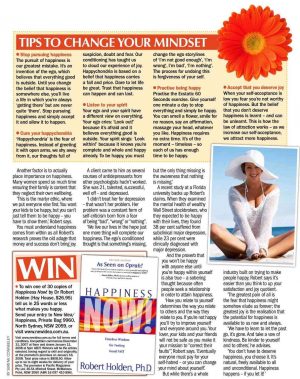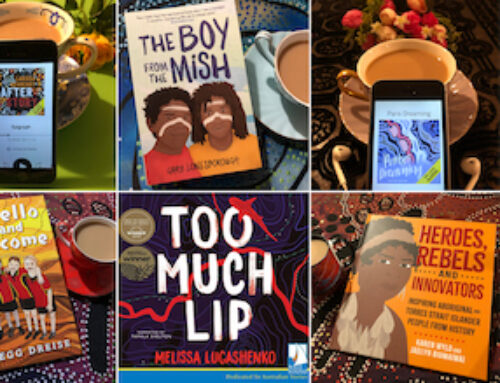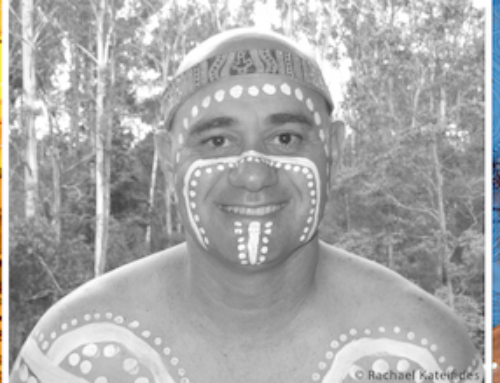Be Happy Now
New Idea – national weekly magazine
Forget the pursuit of happiness – you can choose to feel joy in this very moment.
They say there’s no such thing as a happy psychologist, but Dr Robert Holden has mastered the elusive art of being joyful – and he’s dedicated his life to teaching others how to attain it. The psychologist and best-selling author broke new ground when he refused to dwell on depression while treating the depressed, instead creating the first Laughter Clinic in the UK.
‘What you focus on most often becomes familiar, and what is familiar feels real to you. In our society we focus on pain before joy, tears before laughter and fear before love, so we gradually grow blind to our inner, ever-present potential for happiness,’ Robert explains.
A decade ago the Laughter Clinic developed into The Happiness Project, which runs workshops, trains business people and doctors, consults for universities, creates documentaries and positive media stories and researches the whys and hows of happiness.
Scientists measured the state of mind of participants in Robert’s pioneering eight-week program and proved that his methods do increase happiness, which is the basis for his book Happiness Now!, which offers exercises and meditations on how to heal the barriers to experiencing constant happiness, case histories to illustrate the key points, and a wealth of inspiration and information that will have you jumping for joy no matter what life throws at you.
‘The key to being happy is overcoming “destination addiction”, which is living in the not-now. It’s always about tomorrow, so you’re chasing “more”, “next” and “there”,’ says Robert, whose appearance on The Oprah Winfrey Show shot his book to the top of America’s best-seller lists.
‘You promise yourself that when you get there you’ll be happy. But I promise you that you won’t, because you’ll always set another destination to go for.’
 He says that no thing can make you happy, but you can choose joy over sadness regardless of your circumstance. It’s all about attitude – faced with the same situation, one person will retain their sunny disposition, while another will sink into depression. It’s your perception of life that is important, and you can often attain joy by choosing to look at a situation differently.
He says that no thing can make you happy, but you can choose joy over sadness regardless of your circumstance. It’s all about attitude – faced with the same situation, one person will retain their sunny disposition, while another will sink into depression. It’s your perception of life that is important, and you can often attain joy by choosing to look at a situation differently.
‘You are the key to happiness. More than what happens to you, it is your perceptions, thoughts, beliefs and overall response that are essential. Events in life can so conspire that you may lose sight of this choice, but never is the choice destroyed. The decision to be happy or sad always rests with you, whether you see it that way or not.’
Another factor is to actually place importance on happiness. Many women spend so much time ensuring their family is well and happy that they neglect their own wellbeing.
‘This is what I call a martyr ethic, which is where we’re putting everybody else first instead of ourselves. You want your children to be happy, but you can’t just tell them to be happy – you show them with your example. That’s the key. Stop being a super mum and start being a real mum.’
We must also understand that happiness comes from within – Dr Holden’s research has proven the old adage that money and success don’t bring happiness is true. One of his clients came to him because several courses of antidepressants hadn’t worked. She was 21, talented, successful – and depressed.
‘I didn’t treat her for depression, because that wasn’t her problem. Her problem was a constant, learned form of self-criticism – one born from a fear of being “bad”, “wrong”, “nothing”. No amount of achievement would be good enough for her because deep down she felt guilty and not good enough,’ he says.
‘We live our lives in the hope that just one more thing will complete our happiness. The ego’s conditioned thought is that something is missing, but the only thing missing is the unconditional awareness that nothing is missing.’
A recent study at Florida’s Nova Southeastern University backs up Robert’s claims, proving that money and success don’t bring happiness. Examining the mental health of wealthy Wall Street stockbrokers, 38 per cent met the criteria for subclinical major depression, while 23 per cent were clinically diagnosed with major depression. In contrast, only seven per cent of men in the US are depressed.
And the proverb that you won’t be happy with anyone else until you’re happy within yourself is also true – a sobering thought, because often people seek a relationship in order to attain happiness.
‘The way you relate to yourself ultimately determines the way you relate to others and the way others relate to you. If you’re not happy you’ll try to improve yourself and everyone around you. Your lover, your children and your friends will not be safe from you as you make it your mission to “correct their faults”. Eventually everyone must pay for your self-hatred – or you can change your mind about yourself.’
But while there is a whole industry built on trying to make people happy, Robert says it’s easier than you think to up your satisfaction and joy quotient.
‘The greatest pain of all is the fear that happiness might somehow elude us forever; the greatest joy of all is the realisation that the potential for happiness is available to us now and always,’ he says.
‘We have to learn to let go of our past, we have to give up all hopes for a perfect past. Let the past go, it’s gone. And take a vow of kindness. Be kinder to yourself and to others.
‘You do not have to deserve happiness, you choose it. It is natural, freely available to all and unconditional. Happiness happens, if you let it.’
Top Tips for Happiness
1. Stop pursuing happiness The pursuit of happiness is our greatest mistake. It is an invention of the ego, which believes that everything good is outside. The world doesn’t have your happiness, you do. Until you change the belief that happiness is somewhere else, you’ll only experience a life in which you’re always ‘getting there’ but are never quite ‘there’. Stop pursuing happiness and simply start accepting and allowing happiness to happen.
2. Cure your happychondria ‘Happychondria’ is the term I use to describe the fear of happiness. Instead of greeting happiness with open arms we shy away from it, our thoughts full of suspicion, doubt, cynicism and fear. Our conditioning has taught us to cloud our experience of happiness with endless misperceptions and fearful beliefs. Happychondria is based on a belief that any happiness carries an eventual fall and price. Dare to let life be great, and trust that happiness can happen and that it can last.
3. Look for your light As a psychologist, I was trained to be a problem spotter. I prided myself on how good I was at being able to spot people’s weaknesses, neuroses, fears and hang-ups. But over time I began to have a change of heart. I started to realise the greatest psychotherapy is not in pointing out people’s problems and failures, but in pointing them towards their light, their innate unconditional potential to be happy.
4. Listen to your spirit Your ego and your spirit have a different view on everything. Your ego cries: ‘Look out!’ because it’s afraid and because it believes everything good is outside. Your spirit sings: ‘Look within!’ because it knows that you’re complete and whole and happy already. To be happy you must change the ego storylines of I’m not good enough, I’m wrong, I’m bad, and I’m nothing. The process for undoing this self-judgement is forgiveness of your self.
5. Be happy Practise the Ecstatic 60 Seconds exercise. Give yourself one minute a day to stop everything and simply be happy. You can smell a flower, smile for no reason, say an affirmation, massage your head, whatever you like. Happiness requires no extra time. It is of the moment – timeless – so each of us has time enough to be happy. It takes as much time to be happy as it does to be depressed or resentful.
6. Live in the now As a young child you were alive to the infinite possibilities of the present moment. You were full of wonder, imagination, awe and appreciation for the precious present. Now was your treasure island, and you believed that happiness was here and now, waiting to be seen. The more you believed this, the more you would look; and the more you looked, the more happiness you found.
7. Accept that you deserve joy
The more self-acceptance you have, the more happiness you’ll allow yourself to accept, receive and enjoy. When your self-acceptance is low you fear that you’re not worthy of happiness, so you question, doubt, resist, overlook and push away invitations to be happy. The greatest obstacle to accepting happiness is guilt, and guilt is the belief that you don’t deserve happiness. But this belief is learned – and it can be unlearned. This is how the law of attraction works – as we increase our self-acceptance, we attract more happiness.
Visit the Happiness Institute’s website here.








Get Social